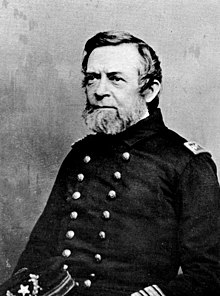Andrew Hull Foote
| Andrew Hull Foote | |
|---|---|

Admiral Foote
|
|
| Born |
September 12, 1806 New Haven, Connecticut |
| Died | June 26, 1863 (aged 56) New York, New York |
| Place of burial | Grove Street Cemetery, New Haven |
| Allegiance |
|
| Service/branch | |
| Years of service | 1822–1863 |
| Rank |
|
| Commands held |
USS Perry USS Portsmouth Western Gunboat Flotilla |
| Battles/wars | |
| Awards | Thanks of Congress |
Suppression of the Slave Trade Second Opium War
Andrew Hull Foote (September 12, 1806 – June 26, 1863) was an American naval officer who was noted for his service in the American Civil War and also for his contributions to several naval reforms in the years prior to the war. When the war came, he was appointed to command of the Western Gunboat Flotilla, predecessor of the Mississippi River Squadron. In that position, he led the gunboats in the Battle of Fort Henry. For his services with the Western Gunboat Flotilla, Foote was among the first naval officers to be promoted to the then-new rank of rear admiral.
Foote was born at New Haven, Connecticut, the son of Senator Samuel A. Foot (or Foote) and Eudocia Hull. As a child Foote was not known as a good student, but showed a keen interest in one day going to sea. His father compromised and had him entered at the United States Military Academy at West Point, New York. Six months later in 1822, he left West Point and accepted an appointment as a midshipman in the United States Navy.
Between 1822 and 1843, Foote saw service in the Caribbean, Pacific, and Mediterranean, African Coast and at the Philadelphia Navy Yard. He first began as a midshipman on the USS Grampus. In 1830, he was commissioned a lieutenant, and was stationed in the Mediterranean. In 1837, Foote circumnavigated the globe in the USS John Adams. After serving on sea, Foote was put in charge of the Philadelphia Naval Asylum. After serving on land he went back to sea, and organized a Temperance Society aboard the USS Cumberland. This group developed into a movement that resulted in ending the policy of supplying grog to U.S. Naval personnel.
...
Wikipedia
